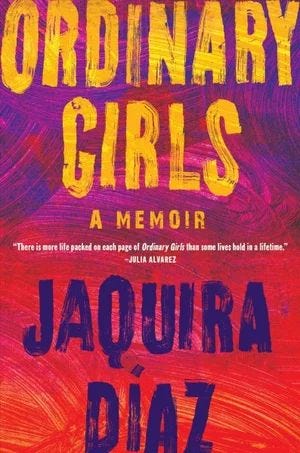Reading My Own Reflection: Finding Home in Ordinary Girls
A book review based on girlhood, grief, and the power of storytelling
We learned to be loud so no one could hear us cry.
We learned to run before we knew where we were going.
And we all had that one friend. You know? The one who didn’t make it. The one who should’ve.
When Jaquira wrote about her friend’s passing, I had to close the book and sit still. Grief like that doesn’t just read, it reaches through the pages and holds you by the throat.
“I carried her story like a ghost, a shadow that hovered in the corner of every room.”
—Jaquira Díaz, Ordinary Girls
What Ordinary Girls Is About (Without Spoilers)
At its core, Ordinary Girls is a memoir about growing up Puerto Rican, queer, and fierce in the face of overwhelming odds. Jaquira Díaz takes us from the housing projects of Puerto Rico and Miami Beach to the chaotic swirl of adolescence shaped by poverty, addiction, violence, and cultural dislocation.
She writes about a fractured family, a troubled relationship with her mother, and the weight of grief and identity but also about friendship, girlhood, music, and survival. Her story isn’t told from a safe distance. It’s raw, immediate, and aching with truth. You follow her through high school halls, juvenile detention centers, beaches soaked in memory, and quiet, gut-wrenching realizations that feel like your own.
It’s a coming-of-age story that refuses to follow the rules. It’s full of rage, beauty, longing, and resilience—and most importantly, it centers the voices of girls who are too often erased.
Layers of Loss, and the Language of Survival
Her story reminded me how loss shows up in layers. Sometimes it’s a person. Sometimes it’s your own reflection. Sometimes it’s the version of yourself you had to bury just to keep going.
What hit hardest wasn’t just the trauma—it was the texture. The way she writes: guttural, graceful, like every sentence has dirt under its nails. Her scenes in Miami felt wrapped in humidity and heartbreak. You could feel the sweat, the smoke, the ache. Her teenage thoughts felt like mine. It felt like reading my own private journal through someone else’s voice.
It was beautifully written without trying too hard to be beautiful. And that made it unforgettable.
Remembering the Girl I Was
As I read, I kept thinking about my own coming-of-age.
The girl I was before motherhood, before marriage, before I learned to choose softness over bracing for the next blow. The girl who stayed in church because her mother needed her to. Who didn’t know she could be queer and still be loved by God. Who clung to culture even when she didn’t know how to live inside it.
This book made me want to write again—not for claps, not for content, but for the girls coming after me. For my daughter. My nieces. For the ones who wonder if they can be soft and strong, Caribbean and bold, messy and magical all at once.
I want them to know they can. I want them to have pages that feel like home, too.
Ordinary Girls didn’t save me.
It reminded me I was never alone in the first place.
Memoirs like this are why I believe storytelling is liberation. It’s not just reading—it’s remembering. Reclaiming. Writing ourselves back into the narrative.
“What I didn’t know then was that we were more than our rage, more than our grief, more than the things we’d done to survive.”
—Jaquira Díaz, Ordinary Girls
I hope you’ll read it. And I hope it reminds you that your story is worth telling, too.
Stay soft. Stay loud. Stay wild.
With warmth,
Angel 🤎✨





Such a great review. I hope Jaquira Díaz reads it one day 😁 Might be worth emailing it to her 😉 She has a new book coming out